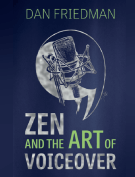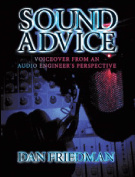 It happened today. I was asked which of the two voiceover talent the client had chosen would be better for a 12 minute narration. “Talent A” and “Talent B” are both seasoned veterans and have great voices and deliveries. The difference is that “Talent B” requires a great deal of time for editing pick-ups, mistakes and fumbled words. On a project this long, the additional time that will be required to work with “Talent B” will be costly to the client. Needless to say, for a job like this, I recommended “Talent A”.
It happened today. I was asked which of the two voiceover talent the client had chosen would be better for a 12 minute narration. “Talent A” and “Talent B” are both seasoned veterans and have great voices and deliveries. The difference is that “Talent B” requires a great deal of time for editing pick-ups, mistakes and fumbled words. On a project this long, the additional time that will be required to work with “Talent B” will be costly to the client. Needless to say, for a job like this, I recommended “Talent A”.
People with stage and live performance experience know that there is only one chance to get it right. Film actors know that film is expensive and multiple takes could become costly. People who have been in the voice over industry for more than 15 years will probably remember working with tape. Tape was also expensive and editing with it was much more difficult and time consuming then digital editing is today. So while many of these expenses and difficulties are less of an issue today, frequent pick-ups are still a tremendous waste of time and can be costly for the client and (as you read in the introduction) for the talent as well.
There is no question that some scripts and styles of reads can be difficult. Fast disclaimers and long scientific or medical narrations can be extremely tricky. But professional voice talent should not struggle with a typical script such as one for a grocery store, car dealership, restaurant, or bank. If the script is written well, a professional voice talent should have little trouble delivering it. It is frustrating when a voice over “talent” is unable to get through more than a few sentences without multiple pick-ups… and don’t even get me started on the editing.
Editing should be a tool for choosing the perfect nuances, eliminating clicks, noises and other anomalies, removing breaths and trimming a read so that it will fit into time constraints. It should not be required to simply get a complete read. The edit desk is not supposed to look like a ransom note (thank you Amy Snively for that analogy).
This is a customer service issue. The time it takes to edit audio full of pick-ups, mistakes, and fumbles can be costly to the client. Voiceover artists who are frequent fumblers require additional time for both recording and editing. Even on straightforward editing jobs, clients as well as voice over talent are often best served using professional audio engineers and editors to edit their audio quickly. When multiple pick-ups are involved, the editors speed is even more important. But even more critical than speed is the engineer’s ability to make disconnected reads sound cohesive (deliveries lacking cohesion can occur easily when multiple pick-ups are involved). His or her editing experience often produces better results than the client or talent can achieve when trying to edit the audio themselves.
Everyone makes mistakes. It is a fact of life. However, if you as a voice over talent routinely have more pick-ups in your reads than an auto dealership in the South has pick-up trucks, then (like those trucks) you’ve got work to do.
Here are some tips:
1- Begin by getting your eyes checked regularly. This should be obvious. If you can’t see the script, how can you possibly read the script?
2- Prepare. Clients don’t always send the script in advance. But, when they do, as a professional voice talent you have a responsibility to prepare. Read the script, mark it up appropriately and ask questions (if you have any) before you start recording.
3- Mentally focus. Do whatever you need to do to prepare yourself to perform the read you are about to deliver. Deep cleansing breaths, reading silently to yourself for a couple of seconds, imagine someone with who you will communicate the message, whatever it is that works for you. Once you are focused… stay focused.
4- Don’t try to memorize. Don’t take your eyes off the page and think you’ll remember what was there. Read the words in front of you.
5- Anticipate. Especially if you didn’t get the script in advance. Anticipate what is coming next based on the words, sentence structure and your experience.
6- Break it up. Break the word or phrase up into smaller components and then pull it together as you repeat it.
7- Repetition. If a word or phrase is difficult for you to say, repeat it over and over again until you get comfortable with it.
8- Adjust your speed. Subtle changes in the speed of your delivery can make it easier to say difficult words or phrases.
9- Practice. Practice reading, out loud and fluently, all of the time.
10- Relax. This is your job. It is what you do. Relax… and make it happen.
Remember, this is a customer service issue. Voice talent who read fluidly, communicate effectively and require minimal editing provide a better experience for their clients. They also save the client valuable time and money.
If you have any additional thoughts or tips, I’d love to hear from you.
 Your advertising dollars and your time are important to you. Do you know how to get the most from your voiceover session? Here are my 10 Tips For Getting the Most From Your Voiceover Session.
Your advertising dollars and your time are important to you. Do you know how to get the most from your voiceover session? Here are my 10 Tips For Getting the Most From Your Voiceover Session.


